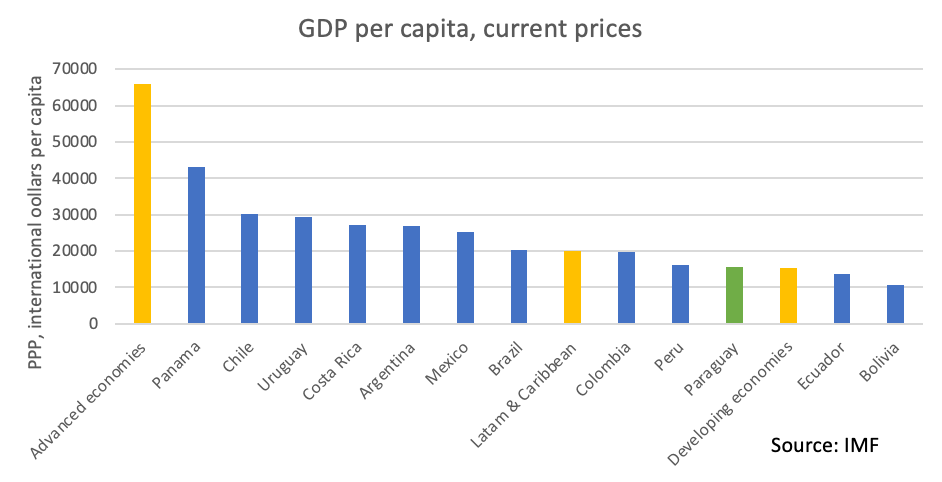The Next Task to the Paraguayan Economy: From Macro Stability to Sustainable Growth
The recent issuance of Guaraní-denominated bonds showcases Paraguay's conquest of macroeconomic stability. Yet, to achieve a higher development status, Paraguay needs to focus on institutional reforms

Paraguay has a unique opportunity to transform its socioeconomic reality. The country recently introduced its first Guaraní-denominated bond, signaling the stability of its macroeconomic environment nurtured over the past two decades. However, Paraguayan policymakers must understand that while macroeconomic stability is crucial, it alone will not be sufficient to advance the nation's development. Genuine progress demands strengthening state institutions, expediting microeconomic reforms, and prioritizing human capital and infrastructure investments.
In the discourse surrounding Latin American political economy, a pervasive cliché asserts that the region's abundant mineral resources, biodiversity, and natural wonders inherently propel its countries towards growth. Yet, this notion could not be further from the truth. Contrary to popular belief, the wealth of developed nations does not stem solely from their natural resources. Michael L. Ross' seminal work demonstrated that natural resources such as oil could become a curse, trapping countries into authoritarian regimes and a natural resource dependence that weakens their development capacity. The true path to prosperity lies in establishing robust institutional frameworks that foster social confidence, investment, innovation, and productivity—an essential departure from the myth of resource-driven growth.
For years, Paraguay has been entangled in a similar narrative. The nation has risen as an agricultural powerhouse, feeding 100 million people globally while establishing its position as a significant producer of soy and beef. Additionally, following the sovereign default of 2003, Paraguay has enjoyed a period of macroeconomic stability by bolstering its fiscal framework and upholding the anti-inflationary policies of the Central Bank. Paraguay's currency, the Guaraní, remains one of the oldest in Latin America, having never experienced hyperinflation like many of its South American neighbors. Nonetheless, effecting a substantial shift in a country's development trajectory cannot rely solely on its commodity sector and macroeconomic stability.
Harvard Professor Dani Rodrik wisely underscores that a singular blueprint for a nation's development does not exist. Attempting to replicate the achievements of the Asian Tigers across distinct contexts and historical periods is inherently flawed. The onus of determining the optimal development path falls upon Paraguay's policymakers. Nevertheless, foundational economic principles entrenched within academic literature provide valuable signposts toward the path to prosperity. While macroeconomic stability undoubtedly holds significance, it alone is insufficient. Santiago Levy, a distinguished Mexican economist, illustrates this point vividly through his analysis of Mexico's post-Peso Crisis experience. Despite attaining macroeconomic stability, Mexico could not break free from the middle-income trap, primarily attributed to its limited capacity to bolster the economy's productivity, characterized by a pervasive informal sector and subdued innovation prospects.
Paraguay shares a challenge reminiscent of Mexico's economic landscape. Despite boasting one of Latin America's lowest debt-to-GDP ratios at 41% (compared to the regional average of 68%), along with a modest tax burden hovering around 10% of GDP and a comparatively favorable business climate, the nation grapples with a per capita GDP that remains notably low even by regional standards. This struggle is accentuated by inadequate infrastructure and educational deficiencies. For instance, Paraguay ranks second to last in South America for average years of schooling. Its quality of education, as evidenced by its 73rd placement out of 81 countries evaluated by PISA, underscores the urgent need for comprehensive educational reform.
Fortunately, the new leadership in Paraguay demonstrates a keen understanding of the necessity to address the nation's structural challenges. Santiago Peña, who assumed the presidency last year, is a youthful leader distinguished by extensive academic, professional, and political experience. Throughout numerous addresses, he has underscored the pivotal role of education as the "key to progress," rightfully prioritizing its advancement along with the expansion of formal employment—a dual strategy essential for bolstering the country's productivity. Peña must also confront other pressing issues to bolster domestic and international confidence in Paraguay. It is also crucial to fight corruption and transnational crime, particularly prevalent in border regions, and to enhance the rule of law through fortifying state institutions. Undoubtedly, addressing these multifaceted challenges will be difficult, yet their resolution is indispensable for positioning Paraguay as a reliable destination for investment.
In a world in transition, Paraguay has the chance to position itself as the jewel of South America. With its 100% clean energy sources from its outstanding hydroelectric production and its plans to expand green hydrogen production, Paraguay can become the home of industries looking for lower carbon emissions and expanding trading with friendly nations. With better human capital, the country can turn itself into a hub of service companies in Mercosur looking for a better business environment than the one offered by its neighbors with massive red tape and tax burdens. If Paraguay successfully improves the rule of law, it can also become a financial hub, competing with other Latin American economies like Uruguay and Panama.
I am sure that Paraguay's Minister of the Economy, Carlos F. Valdovinos, whom I had the privilege to study under the macroeconomic policymaking course, is pleased with the successful issuance of Guaraní-denominated bonds, which garnered demand five times higher than the issuance. Furthermore, I am certain he takes pride in Paraguay's recent rating upgrade, bringing it closer to attaining investment-grade status. These accomplishments are pivotal in strengthening the nation's debt profile and bolstering its macro fundamentals. While emphasizing the significance of macroeconomic policy, it is imperative to recognize that it is but one facet of development. To propel Paraguay towards prosperity, the government must focus on the most challenging parts of policymaking: institutional and microeconomic reforms and investments in infrastructure and human capital.




